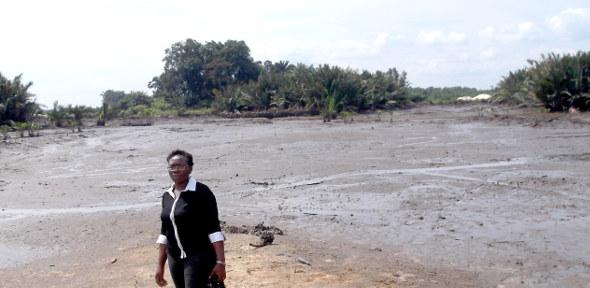
The trial construction of a road in the Niger Delta region of Nigeria has been made possible through generous funding from the Cambridge-Africa Alborada Research Fund through the Cambridge in Africa Programme.
We are thrilled with this research grant funding and the timing is perfect for Funmi's PhD work. We were also delighted that the panel were so enthused by our proposal that they asked if this trial road section could be named Cambridge-Africa Alborada Road.
Dr Abir Al-Tabbaa
This is part of a collaboration between Dr Abir Al-Tabbaa and PhD student Funmilayo Alayaki, from the Department's Geotechnical and Environmental Group, and Professor Josiah Ayotamuno, Dean of Engineering, at Rivers State University of Science and Technology (RSUST), in Port Harcourt in the Niger Delta region of Nigeria together with the Niger Delta Development Commission (NDDC) who have offered significant in-kind contributions.
The Niger Delta region is plagued with failed and deteriorating roads which have greatly impaired economic growth in that region with adverse effects on the social and environmental dimensions. The area is swampy and the soils are problematic: expansive, highly acidic and gap- or poorly-graded. There is significant lack of understanding of the local soils and their engineering properties and so these soils are usually used as road sub-bases without any treatment or stabilisation. This in turn leads to such persistent road failures.
Funmi's PhD work is investigating the improvement of the performance of these problematic soils through their stabilisation with a range of cementitious binders. In a trip to the region last summer, Funmi collected site soils, which have been characterised in the laboratory and are currently being tested following stabilisation. The use of binders, which are locally available, including fly ash from a local thermal desorption facility, will be maximised to minimise costs.
The Cambridge-Africa Alborada Research fund was established with generous support from The Alborada Trust, to help researchers from Sub-Sahara African institutions and the University of Cambridge to initiate and/or strengthen collaborations (across all disciplines), by providing funding for research and travel costs.
Funmi will shortly be heading back to Nigeria to obtain soil samples from the exact location of the proposed trial road and to conduct large scale laboratory treatability studies using those soils in the laboratories at RSUST. This will be followed by the trial road construction, which is planned to start in November, at the start of the dry season in that area. Coring will be carried out following construction and then again following months of traffic use and environmental exposure. PhD students from RSUST will also be involved in this initiative as part of their PhD studies which will strengthen collaboration between the two groups. An outline of a large collaborative proposal was submitted to the NDDC last year on the development of a sustainable road construction and maintenance system in the Niger Delta. This will involve much larger field trials of road construction and will include on-site monitoring and assessment over a number of years and will also address the broader range of problems there including environmental pollution issues, material selection, construction practices and quality control as well as the reliability of the codes of practice. It is hoped that the trial road construction as part of Funmi's PhD work will pave the way for this much larger project and longer term collaboration prospects.
For further details please contact Dr Al-Tabbaa, aa22@cam.ac.uk.

